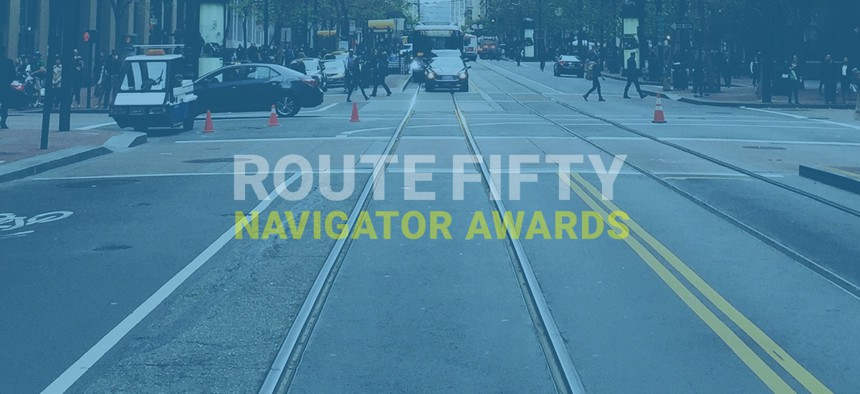Navigator Award Finalists: Kim Scott Heinle and Team From SEPTA Customer Service and Advocacy Dept.

A transit agency aims to take customer service challenges and use them as engagement opportunities.
This is the 20th in a series of profiles on the 50 finalists for Route Fifty’s Navigator Awards program. The first 10 finalists were from the Government Allies and Cross-Sector Partners category. Finalists 11-20 were from the Agency and Department Leadership category. Finalists 21-30 were from the Executive Leadership category. Finalists 31-40 were from the Next Generation category. Finalists 41-50 were from the Data and IT Innovators category. Explore our complete list of 50 finalists.
Public transit agencies often have some of the toughest customer-service challenges because of the nature of the work. In the transportation sector, getting people from Point A to Point B, doesn’t always run smoothly—or on schedule. Things can and do go awry despite best efforts to keep the trains, streetcars and buses running on time and public-facing services operating smoothly.
So customer service personnel have an important role in to play in helping resolve problems that are impacting passengers, while answering their questions or addressing their concerns, regardless of whether they contacted the agency through an online complaint form, a telephone call center or through social media. Online interactions can require careful digital diplomacy, and that’s something where the Southeastern Pennsylvania Transportation Authority has some success stories.
At SEPTA, which runs commuter rail, trolley, subway, bus and paratransit services in and around Philadelphia, the Customer Service and Advocacy Department plays that intermediary role between riders and the agency.
“As SEPTA’s regional influence has grown and our reputation become more favorable, how we interact with our customers is increasingly defined not by our role as a transportation provider, but how we stack up against all other businesses with whom they interact daily,” Kim Scott Heinle, SEPTA’s assistant general manager for customer service and advocacy, wrote in a customer service program report last year. “Our customers increasingly rely on us as their chosen and preferred choice for travel. This new relationship, increasingly defined by personal allegiance to urban and sustainable lifestyles, has recalibrated the way customer service and the provision of public transit are viewed and measured.”
SEPTA, naturally, collects data related to its customer service interactions. Ninety-percent of the complaints, questions and concerns that come in can be handled by the customer call center. But 10 percent of those inquiries and gripes can’t be handled by frontline customer service personnel. And that challenge offers an opportunity for the agency.
As our Route Fifty colleagues at Nextgov recently featured, SEPTA has a way to “turn customer service complaints into potential customer-service victories.”
The 10 percent of complaints frontline staff can’t answer upfront are referred to SEPTA employees in the field who can. That employee—whether he or she is a bus operator or the transportation director—calls the customer back with an answer.
“The trick here is to have the person who owns the service delivery call customer back, and that is an amazing moment,” Heinle said at a Federal Customer Service Experience Summit hosted by Nextgov and Government Executive on Sept. 20. “The next day, you get a call back from the director of transportation to talk about your issue, it creates an amazing, 'oh my God' moment. We really follow up.”
When you boil it down, that’s a relatively simple idea for those in agency management: When appropriate, have the person responsible for the issue follow-up directly on the specific customer-service complaint.
“We hear, we listen and we give the customer an answer,” Heinle said. “It may not always be the answer they want, but when they hang up, they feel satisfied. And when we can’t answer it, we go to the subject matter expert in the field.”
That approach, along with SEPTA’s proactive use of social media outreach to connect with customers makes us happy to name Heinle and the SEPTA Customer Service and Advocacy Department as Route Fifty Navigator Award finalists.
Michael Grass is Executive Editor of Government Executive’s Route Fifty and is based in Seattle.
NEXT STORY: Navigator Award Finalists: Ken Guy and Sandy Hanks, Procurement Reform Efforts in King County, Wash.






